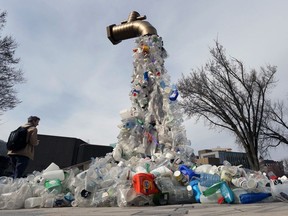It’s not enough to better manage waste plastic or rely on recycling. We must drastically cut plastic production.

Article content
Plastic pollution is one of the greatest environmental problems facing our planet today. It’s estimated that by 2040, 20,000 million metric tons of plastic will be generated, double that produced in 2020.
From entanglements, mutilations, strangulation and asphyxiation of marine life to the health effects and diseases associated with plastics and their chemicals, plastic pollution in the marine environment is a growing global crisis that demands urgent attention.
Advertisement 2
Article content
Article content
Four years ago, the UN Environment Assembly pledged to develop an international legally binding treaty on plastic pollution, including the marine environment. The international committee tasked with developing this treaty is currently meeting in Ottawa from April 21 until April 29, the penultimate meeting before a finalized treaty is ratified.
Ahead of this meeting, the Scientists Coalition for an Effective Treaty is calling for the treaty to commit to reducing “virgin plastic” production. Technically known as primary plastic polymers, or PPP, these are materials made of synthetic and semi-synthetic polymers that are used for the first time to create plastic products in any form.
In short, they’re entirely new plastics, often made from fossil fuels. Almost all or most of the plastics are produced by the petrochemical industry. These PPP and new plastic products are associated with thousands of chemicals, many of which are known to be persistent, bio-accumulative, mobile and toxic, known as PBMT chemicals.
It’s not enough to better manage waste plastic or rely on recycling. We must drastically cut plastic production. We can attack the root of the plastic pollution problem by transitioning away from the extraction of fossil-fuel feedstock through the definition and implementation of binding national targets.
Advertisement 3
Article content
The coalition’s recommendations include the implementation of multi-stakeholder processes grounded in a robust, evidence-based and conflict-of-interest-free policy, supported by transparent monitoring, reporting and assessment processes based on five key reduction pathways with implications for human and environmental health:
• One: Reduce non-essential material and plastics.
• Two: Reduce unsafe and unsustainable harmful plastics.
• Three: Increase transparency and responsibility, including that industries should be accountable across the plastics’ full life cycle, right through plastic pollution to remediation.
• Four: Improve compliance mechanisms.
The coalition is also calling on the committee to foster evidence-based assessments of sustainability, safety, essentiality and transparency criteria to ensure safe and sustainable production and consumption of plastics.
For example, the transparency criteria entail that producers should disclose the composition of chemicals and materials present in plastics from extraction to production, and information on tracking, monitoring, traceability, marking and labelling.
Advertisement 4
Article content
Likewise, the essentiality criteria call for eliminating non-essential, hazardous and unsustainable uses of plastic. Where plastic is deemed “essential,” such as the application of plastics in medical devices or plastics used in developing nations or remote and rural areas to provide basic service and sanitization, it should be replaced by safer, more sustainable alternatives.
The committee must incorporate these evidence-based arguments before its final session in November to ensure they’re present in the final treaty text. It’s imperative to have a strong, proactive treaty that curtails escalating plastic pollution.
Mid- or downstream measures are insufficient: We must significantly reduce the extraction and production of non-essential virgin plastics. This recommendation is fundamental for ending plastic pollution in the marine environment.
This week, following Earth Day on April 22, we all must call for the end of plastic pollution for the sake of human, biodiversity and planetary health, demanding a 60 per cent reduction in the production of plastics by 2040 with the ultimate goal of building a plastic-free future for generations to come.
Juan José Alava and Ibrahim Issifu are members of the Scientists Coalition for an Effective Plastic Treaty and researchers at the University of B.C. Institute for the Oceans and Fisheries.
Recommended from Editorial
Article content




